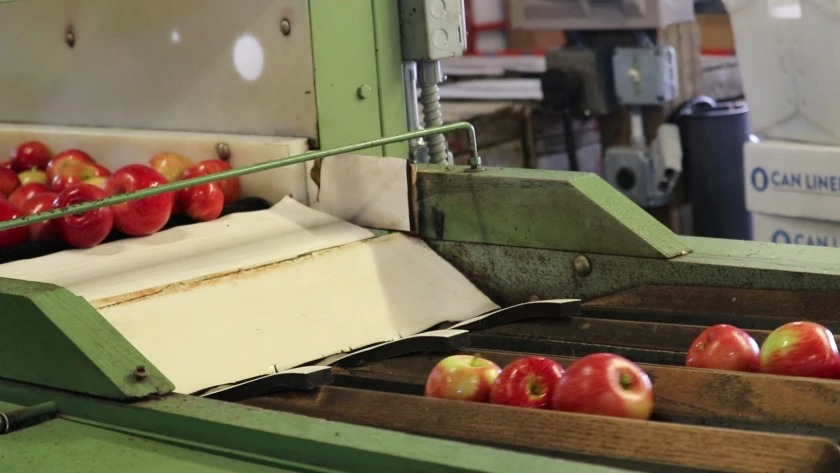
Minnesota agriculture on front lines of fighting climate change
To cap off the state’s warmest and driest September on record, Minnesota agriculture officials gathered at an apple orchard in White Bear Lake to highlight state and federal climate investments.
The media event showcased the long list of state programming for agricultural operations meant to curb climate change and the $3.5 billion in federal climate grants that Minnesota has received since 2022.
The Minnesota Department of Agriculture hosted the outing at Pine Tree Apple Orchard, which is enrolled in the Minnesota Agricultural Water Quality Certification Program and is a 40-year member of the state’s Minnesota Grown program.
John Jacobson owns and operates the orchard, along with one in southeast Minnesota, with his siblings. Jacobson said the orchard started down the road of sustainability in the 1990s when he and his brother toured parts of the country to research integrated pest management.
John Jacobson, left, one of the owners of Pine Tree Apple Orchard, talks with Minnesota Ag Commissioner Thom Petersen and Minnesota Lt. Gov. Peggy Flanagan at a climate week event on Sept. 27, 2024, at the orchard in White Bear Lake. (Noah Fish / Agweek)
“We started with (integrated pest management), and that basically is a lot of trapping of insects, and if they reach an economic threshold, then we do a control measure,” he said. “That immediately cut down on the amount of usage that we have of chemicals.”
Micro-irrigation was one of the next sustainable practices to be used at the orchard, which cuts back on water use. The netting that covers high-value apples at the orchard reduces the amount of inputs on the trees while also keeping insects out, Jacobson said.
No middle ground
Pine Tree Apple Orchard has tracked its bloom and harvest dates back to the 1950s. Jacobson said those dates haven’t changed much over the years, with bloom coming between May 5-10 and harvest wrapping up by Halloween.
“That really hasn’t changed dramatically, but it’s the inside of that window that has — like we just had this very, very wet spring, and now we’re in the driest September in recorded history,” he said at the event last week. “I’ve always said that Mother Nature will equalize itself very rapidly, so you start out over here, and then it goes way over here. It just seems like we don’t have that middle anymore, like when I was growing up.”
Minnesota Ag Commissioner Thom Petersen said the department recognizes that climate change is impacting agriculture in Minnesota and around the world, with “increased temperatures as well as more extreme and frequent weather events like floods and drought leading to increased challenges for our producers.”
State programming
The Minnesota Department of Agriculture offers a number of funding opportunities to support farmers interested in adopting climate-smart practices including the Water Quality Certification Program, which has more than 1,500 producers enrolled. Through the Preparing for Extreme Weather Grant, the department has awarded over $450,000 in grant funding to 71 farmers to fund projects like hail protection, fans and misters for livestock, and well upgrades.
Joan Heim-Welch points to one of the many sections of her Houston County farmland where she’s implemented a new conservation structure. Heim-Welch is one of more than 1,500 farmers who’ve been certified through the Minnesota Agricultural Water Quality Certification Program. (Noah Fish / Agweek)
The Soil Health Financial Assistance Grant awarded over $2.8 million to 97 individuals and organizations in the first two rounds of funding, with the most requested equipment being no-till drills, air seeders and strip-tillage machinery.
The Biofuels Infrastructure Grant, which got financial support from the Minnesota Corn Growers Association, awarded $9 million for 60 Minnesota fuel stations since its launch in 2022.
The Sustainable Agriculture Demonstration Grant, published in MDA’s Greenbook, is currently accepting applications for $350,000 in grant funding through December 2024.
“I just got back from our National Association of State Departments of Agriculture conference, and other commissioners are a lot of times very jealous of the programs that we have in the state, and the things that we’re taking steps on,” Petersen said.
Federal climate investments: TBD
Minnesota is now poised to bring in at least $200 million in federal funding through the EPA’s Climate Pollution Reduction Grants program.
The money will fund what the Department of Agriculture and the Pollution Control Agency call the Minnesota Climate-Smart Food Systems project, which allots $20 million to expand current state initiatives including the MAWQCP and Soil Health Financial Assistance program.
About $6.7 million will also be invested in the “replacement and upgrading of vehicles and equipment that are used to grow and transport food, such as tractors and freight trucks, to switch to using cleaner-burning fuels,” according to the Minnesota Department of Agriculture.
Two years ago, to combat climate change’s impact on agriculture, the Biden-Harris administration dispersed $22 billion for climate-smart agriculture, as part of the administration’s investments in clean energy and climate solutions through the Inflation Reduction Act.
Many Republican leaders disagree with the sweeping policies and investments in climate change, and the distance between the two sides has played a role in delaying the passage of a new farm bill. The bill, passed in 2018, expired Sept. 30, 2023, and later was extended another year. It expired again on Sept. 30, 2024.
Minnesota’s Democratic Lt. Gov. Peggy Flanagan acknowledged on Sept. 27 that a Donald Trump presidency would likely lead to a rollback in climate-smart investments in agriculture.
“I’m going to do everything I can to ensure that there isn’t a second Trump presidency, but barring that, I know that climate investments, such as in sustainable aviation fuel, is good for Minnesota’s economy,” she said. “It’s good for the region and the entire country. I think we have a case to be made, regardless of who is in the White House.”
Related Articles
Q&A: How a new Girl Scouts program aims to cultivate the next generation of leaders
Letters: St. Paul’s rise in property taxes is unsustainable
Circumstantial evidence at issue as Nicholas Firkus murder conviction goes to appeal
Some testimony from Madeline Kingsbury’s friends, family barred from Fravel murder trial
Minnesota natives work to rebuild N.C. brewery after Hurricane Helene’s destruction


